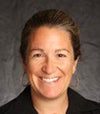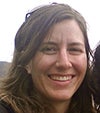The Wayne Morse Center for Law and Politics announced the selection of two resident scholars – Carrie Leonetti and Gabriela Martinez – and two dissertation fellows – Kathryn Miller and Alan Reynolds – for 2014–15.
Each year the Wayne Morse Center hosts two University of Oregon faculty members as resident scholars, one from the School of Law and one from another UO department, and with the support of the Graduate School, the center also awards two fellowships to Ph.D. candidates.
 Leonetti, an associate professor of law, will continue her scholarship on electronic privacy and democracy. Her project examines the balance between privacy and security, the nature of searches, the role of cellphone companies and Internet providers, and who should decide the questions of the appropriate limits on how the government conducts digital searches.
Leonetti, an associate professor of law, will continue her scholarship on electronic privacy and democracy. Her project examines the balance between privacy and security, the nature of searches, the role of cellphone companies and Internet providers, and who should decide the questions of the appropriate limits on how the government conducts digital searches.
Martinez, an associate professor in the School of Journalism and Communication, builds on her work in Latin America in “Media, Democracy and the Construction of Collective Memory.” The project focuses on how media shape collective memories, and what it means to "construct" collective/historical memory through media. She will examine how media production can address human rights violations, promote social change and strengthen democratic practices.
 Kathryn Miller, a Ph.D. candidate in the Department of Political Science, writes on the gap between the number of immigrant women who face intimate partner violence and those being afforded state assistance. Miller examines how policy fails to respond effectively to immigrant women facing intimate partner violence and, worse, how it fosters conditions under which such violence thrives, raising the idea that the state can do harm in this situation.
Kathryn Miller, a Ph.D. candidate in the Department of Political Science, writes on the gap between the number of immigrant women who face intimate partner violence and those being afforded state assistance. Miller examines how policy fails to respond effectively to immigrant women facing intimate partner violence and, worse, how it fosters conditions under which such violence thrives, raising the idea that the state can do harm in this situation.
 Alan Reynolds, a Ph.D. candidate in the philosophy department, challenges the dominant assumption in political philosophy that reasonable people will agree about matters of basic justice. He argues that consensus is often impossible. Reynolds will show how our new media landscape makes disagreements about economic issues especially antagonistic, and how we might learn to better live with our intractable disagreements.
Alan Reynolds, a Ph.D. candidate in the philosophy department, challenges the dominant assumption in political philosophy that reasonable people will agree about matters of basic justice. He argues that consensus is often impossible. Reynolds will show how our new media landscape makes disagreements about economic issues especially antagonistic, and how we might learn to better live with our intractable disagreements.
- by Abbie Stillie, Wayne Morse Center for Law and Politics

